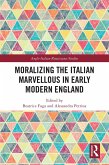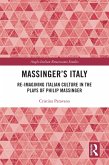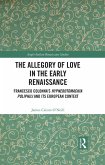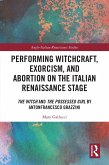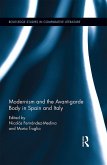Moralizing the Italian Marvellous in Early Modern England (eBook, ePUB)
Redaktion: Fuga, Beatrice; Petrina, Alessandra
42,95 €
42,95 €
inkl. MwSt.
Sofort per Download lieferbar

21 °P sammeln
42,95 €
Als Download kaufen

42,95 €
inkl. MwSt.
Sofort per Download lieferbar

21 °P sammeln
Jetzt verschenken
Alle Infos zum eBook verschenken
42,95 €
inkl. MwSt.
Sofort per Download lieferbar
Alle Infos zum eBook verschenken

21 °P sammeln
Moralizing the Italian Marvellous in Early Modern England (eBook, ePUB)
Redaktion: Fuga, Beatrice; Petrina, Alessandra
- Format: ePub
- Merkliste
- Auf die Merkliste
- Bewerten Bewerten
- Teilen
- Produkt teilen
- Produkterinnerung
- Produkterinnerung

Bitte loggen Sie sich zunächst in Ihr Kundenkonto ein oder registrieren Sie sich bei
bücher.de, um das eBook-Abo tolino select nutzen zu können.
Hier können Sie sich einloggen
Hier können Sie sich einloggen
Sie sind bereits eingeloggt. Klicken Sie auf 2. tolino select Abo, um fortzufahren.

Bitte loggen Sie sich zunächst in Ihr Kundenkonto ein oder registrieren Sie sich bei bücher.de, um das eBook-Abo tolino select nutzen zu können.
This collection shows various declinations of the early modern Italian marvellous, whose English translation often became a moralized version of Italy's uniqueness.Through the analysis of various literary genres the volume focuses on the mechanisms of appropriation and rejection of Italian culture through imported topoi and narremes
- Geräte: eReader
- mit Kopierschutz
- eBook Hilfe
Andere Kunden interessierten sich auch für
![Moralizing the Italian Marvellous in Early Modern England (eBook, PDF) Moralizing the Italian Marvellous in Early Modern England (eBook, PDF)]() Moralizing the Italian Marvellous in Early Modern England (eBook, PDF)42,95 €
Moralizing the Italian Marvellous in Early Modern England (eBook, PDF)42,95 €![Massinger's Italy (eBook, ePUB) Massinger's Italy (eBook, ePUB)]() Cristina ParavanoMassinger's Italy (eBook, ePUB)42,95 €
Cristina ParavanoMassinger's Italy (eBook, ePUB)42,95 €![The Allegory of Love in the Early Renaissance (eBook, ePUB) The Allegory of Love in the Early Renaissance (eBook, ePUB)]() James Calum O'NeillThe Allegory of Love in the Early Renaissance (eBook, ePUB)42,95 €
James Calum O'NeillThe Allegory of Love in the Early Renaissance (eBook, ePUB)42,95 €![Performing Witchcraft, Exorcism, and Abortion on the Italian Renaissance Stage (eBook, ePUB) Performing Witchcraft, Exorcism, and Abortion on the Italian Renaissance Stage (eBook, ePUB)]() Mary GallucciPerforming Witchcraft, Exorcism, and Abortion on the Italian Renaissance Stage (eBook, ePUB)44,95 €
Mary GallucciPerforming Witchcraft, Exorcism, and Abortion on the Italian Renaissance Stage (eBook, ePUB)44,95 €![Kazuo Ishiguro and Ethics (eBook, ePUB) Kazuo Ishiguro and Ethics (eBook, ePUB)]() Laura ColombinoKazuo Ishiguro and Ethics (eBook, ePUB)42,95 €
Laura ColombinoKazuo Ishiguro and Ethics (eBook, ePUB)42,95 €![Modernism and the Avant-garde Body in Spain and Italy (eBook, ePUB) Modernism and the Avant-garde Body in Spain and Italy (eBook, ePUB)]() Modernism and the Avant-garde Body in Spain and Italy (eBook, ePUB)50,95 €
Modernism and the Avant-garde Body in Spain and Italy (eBook, ePUB)50,95 €![The Circulation of Poetry in Manuscript in Early Modern England (eBook, ePUB) The Circulation of Poetry in Manuscript in Early Modern England (eBook, ePUB)]() Arthur F. MarottiThe Circulation of Poetry in Manuscript in Early Modern England (eBook, ePUB)42,95 €
Arthur F. MarottiThe Circulation of Poetry in Manuscript in Early Modern England (eBook, ePUB)42,95 €-
-
-
This collection shows various declinations of the early modern Italian marvellous, whose English translation often became a moralized version of Italy's uniqueness.Through the analysis of various literary genres the volume focuses on the mechanisms of appropriation and rejection of Italian culture through imported topoi and narremes
Dieser Download kann aus rechtlichen Gründen nur mit Rechnungsadresse in A, B, BG, CY, CZ, D, DK, EW, E, FIN, F, GR, HR, H, IRL, I, LT, L, LR, M, NL, PL, P, R, S, SLO, SK ausgeliefert werden.
Produktdetails
- Produktdetails
- Verlag: Taylor & Francis eBooks
- Erscheinungstermin: 8. November 2024
- Englisch
- ISBN-13: 9781040225790
- Artikelnr.: 72335322
- Verlag: Taylor & Francis eBooks
- Erscheinungstermin: 8. November 2024
- Englisch
- ISBN-13: 9781040225790
- Artikelnr.: 72335322
- Herstellerkennzeichnung Die Herstellerinformationen sind derzeit nicht verfügbar.
Beatrice Fuga holds a PhD in English Studies. After completing her Master's degree in English Studies, she obtained a funded PhD at the Université Sorbonne Nouvelle, where she currently teaches English literature, grammar, and translation. Her research revolves around the reception of Italian novelle in the early modern period and the role of translation in European cultural and political relationships. She has published articles on the reception of Italian novelle in early modern Europe, the interaction between the novella and English early modern theatre, and the materiality of the book. She also works on the translation of medical texts in early modern England, and on the cultural and medical representation of love melancholy and hysteria. Alessandra Petrina is Professor of English Literature at the Università di Padova, Italy. Her research focuses primarily on late-medieval and early modern intellectual history and on Anglo-Italian cultural relations. She has published The Kingis Quair (1997); Cultural Politics in Fifteenth-Century England: The Case of Humphrey, Duke of Gloucester (2004); Machiavelli in the British Isles: Two Early Modern Translations of the Prince (2009); and Petrarch's Triumphi in the British Isles (2020). Her latest book is Shakespeare: guida ad Otello (2022).
List of Contributors
1. Introduction: the taming of the mirabile
Beatrice Fuga
Section 1: The moralization of tragedy
2. George Turberville and the politics of tragedy, power and love in the Tragical Tales (1574)
Alice Equestri
3. 'States in woe' and 'wretched wights': George Turberville's Tragical Tales and the Italian novelle
Flavia Palma
4. Geoffrey Fenton and 'the Italian manner': moralizing Bandello, exoticizing Italy
Luigi Marfé
Section 2: Moralizing custom
5. Urbino Englished: Castiglione in unfamiliar clime
Francisco Nahoe
6. 'Polished and filed according to the right sence of the author': domesticating Leonardo Fioravanti's Il reggimento della peste in Elizabethan England
Luca Baratta
Section 3: From Orlando to Othello
7. Reverberations of Rodomonte in and around Othello
Richard Hillman
8. 'The immortal part': Othello, Giraldi Cinzio's novella, and the power of words
Alessandra Petrina
9. Charlotte Lennox as translator and critic: feminine subjectivity and Italian identity in Giraldi Cinzio's Gli Ecatommiti and Shakespeare's Othello
Kiawna Brewster
Section 4: Moralizing Women
10. Appropriating morality: the tale of Ghismonda and the English Decameron
Elena Spinelli
11. Anne Geoffroy
'What followed it were folly to describe': representing Venice in William Painter's Palace of Pleasure (1566) and the poetics of edification
12. Resounding fame in Matteo Bandello's Novelle (1554) and Geoffrey Fenton's Tragicall Discourses (1567)
Beatrice Fuga
Index
1. Introduction: the taming of the mirabile
Beatrice Fuga
Section 1: The moralization of tragedy
2. George Turberville and the politics of tragedy, power and love in the Tragical Tales (1574)
Alice Equestri
3. 'States in woe' and 'wretched wights': George Turberville's Tragical Tales and the Italian novelle
Flavia Palma
4. Geoffrey Fenton and 'the Italian manner': moralizing Bandello, exoticizing Italy
Luigi Marfé
Section 2: Moralizing custom
5. Urbino Englished: Castiglione in unfamiliar clime
Francisco Nahoe
6. 'Polished and filed according to the right sence of the author': domesticating Leonardo Fioravanti's Il reggimento della peste in Elizabethan England
Luca Baratta
Section 3: From Orlando to Othello
7. Reverberations of Rodomonte in and around Othello
Richard Hillman
8. 'The immortal part': Othello, Giraldi Cinzio's novella, and the power of words
Alessandra Petrina
9. Charlotte Lennox as translator and critic: feminine subjectivity and Italian identity in Giraldi Cinzio's Gli Ecatommiti and Shakespeare's Othello
Kiawna Brewster
Section 4: Moralizing Women
10. Appropriating morality: the tale of Ghismonda and the English Decameron
Elena Spinelli
11. Anne Geoffroy
'What followed it were folly to describe': representing Venice in William Painter's Palace of Pleasure (1566) and the poetics of edification
12. Resounding fame in Matteo Bandello's Novelle (1554) and Geoffrey Fenton's Tragicall Discourses (1567)
Beatrice Fuga
Index
List of Contributors
1. Introduction: the taming of the mirabile
Beatrice Fuga
Section 1: The moralization of tragedy
2. George Turberville and the politics of tragedy, power and love in the Tragical Tales (1574)
Alice Equestri
3. 'States in woe' and 'wretched wights': George Turberville's Tragical Tales and the Italian novelle
Flavia Palma
4. Geoffrey Fenton and 'the Italian manner': moralizing Bandello, exoticizing Italy
Luigi Marfé
Section 2: Moralizing custom
5. Urbino Englished: Castiglione in unfamiliar clime
Francisco Nahoe
6. 'Polished and filed according to the right sence of the author': domesticating Leonardo Fioravanti's Il reggimento della peste in Elizabethan England
Luca Baratta
Section 3: From Orlando to Othello
7. Reverberations of Rodomonte in and around Othello
Richard Hillman
8. 'The immortal part': Othello, Giraldi Cinzio's novella, and the power of words
Alessandra Petrina
9. Charlotte Lennox as translator and critic: feminine subjectivity and Italian identity in Giraldi Cinzio's Gli Ecatommiti and Shakespeare's Othello
Kiawna Brewster
Section 4: Moralizing Women
10. Appropriating morality: the tale of Ghismonda and the English Decameron
Elena Spinelli
11. Anne Geoffroy
'What followed it were folly to describe': representing Venice in William Painter's Palace of Pleasure (1566) and the poetics of edification
12. Resounding fame in Matteo Bandello's Novelle (1554) and Geoffrey Fenton's Tragicall Discourses (1567)
Beatrice Fuga
Index
1. Introduction: the taming of the mirabile
Beatrice Fuga
Section 1: The moralization of tragedy
2. George Turberville and the politics of tragedy, power and love in the Tragical Tales (1574)
Alice Equestri
3. 'States in woe' and 'wretched wights': George Turberville's Tragical Tales and the Italian novelle
Flavia Palma
4. Geoffrey Fenton and 'the Italian manner': moralizing Bandello, exoticizing Italy
Luigi Marfé
Section 2: Moralizing custom
5. Urbino Englished: Castiglione in unfamiliar clime
Francisco Nahoe
6. 'Polished and filed according to the right sence of the author': domesticating Leonardo Fioravanti's Il reggimento della peste in Elizabethan England
Luca Baratta
Section 3: From Orlando to Othello
7. Reverberations of Rodomonte in and around Othello
Richard Hillman
8. 'The immortal part': Othello, Giraldi Cinzio's novella, and the power of words
Alessandra Petrina
9. Charlotte Lennox as translator and critic: feminine subjectivity and Italian identity in Giraldi Cinzio's Gli Ecatommiti and Shakespeare's Othello
Kiawna Brewster
Section 4: Moralizing Women
10. Appropriating morality: the tale of Ghismonda and the English Decameron
Elena Spinelli
11. Anne Geoffroy
'What followed it were folly to describe': representing Venice in William Painter's Palace of Pleasure (1566) and the poetics of edification
12. Resounding fame in Matteo Bandello's Novelle (1554) and Geoffrey Fenton's Tragicall Discourses (1567)
Beatrice Fuga
Index

